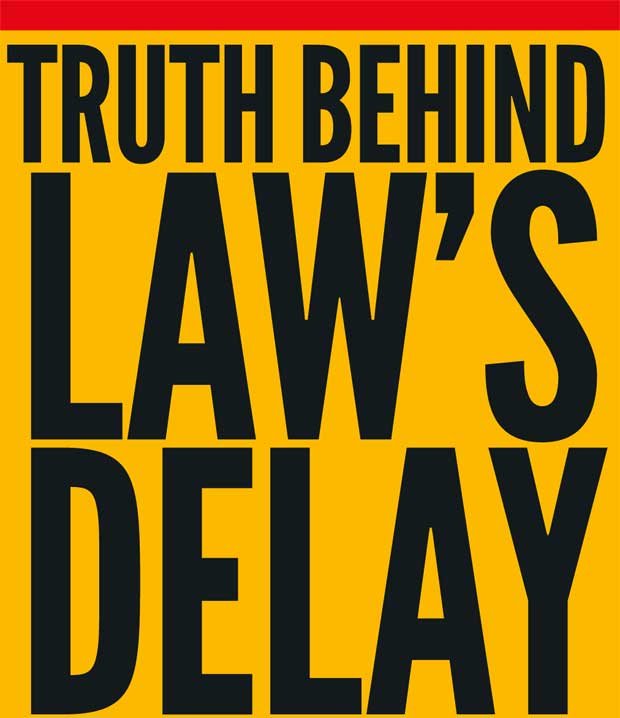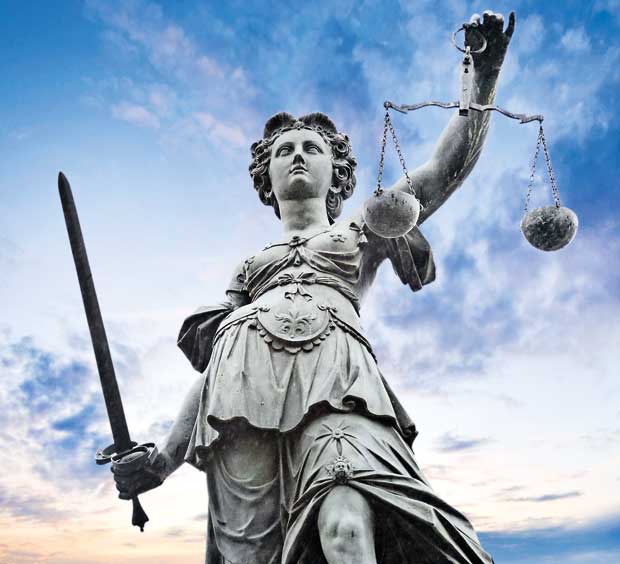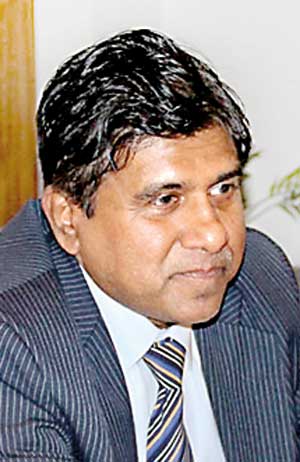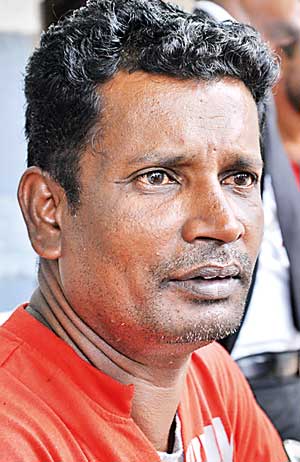Reply To:
Name - Reply Comment
Last Updated : 2024-04-18 08:00:00


When we mentioned the complaints made by victims that there was no particular time limit specified for the conclusion of a law suit, Attorney M.C.M. Muneer said, “I believe that any judge can go through the facts of any case within half an hour to one hour to decide in favour of one of the parties to the case and on his or her ruling. Yet, some cases drag on for decades and even pass on to the next generation. But even in such cases you can appeal.
This can take another five to six years and ultimately it will end up in the Supreme Court and drag on for decades.”
He said the courts were incapable of handling the mounting number of cases.” Certain cases are heard only once a year because courts cannot accommodate them twice,” Mr. Muneer said. Cases are postponed when judges, litigants, the lawyers or some other party or parties to the case are absent. A litigant in a land encroachment case which is continuing since 2007 told us that the case was mostly delayed because the judge was changed or was absent.
“Court cases have turned out to be a great hassle. Half of our working day is wasted and to make matters worse are always postponed,” he said.
Mr. Muneer told us that there was no mechanism in place to hear cases by another judge in the  absence of the one who normally heard the case. “This happens because of the shortage of judges or because there is no provision in our judicial system by the Judicial Services Commission,” he said. “There is a large backlog in the magistrate courts. Minor cases may drag on till 5.00 p.m. However, if there was a good rapport with the judges and lawyers the case can be concluded much faster,” a senior state counsel attached to the law enforcement authority said adding that “Judges are overburdened with work.
absence of the one who normally heard the case. “This happens because of the shortage of judges or because there is no provision in our judicial system by the Judicial Services Commission,” he said. “There is a large backlog in the magistrate courts. Minor cases may drag on till 5.00 p.m. However, if there was a good rapport with the judges and lawyers the case can be concluded much faster,” a senior state counsel attached to the law enforcement authority said adding that “Judges are overburdened with work.
There is a shortage of courthouses, and almost all the criminal cases come to Colombo. It is humanly impossible to handle all the cases. When a case comes from the outstation, we find that some of the cases are outdated or that they have no substance. We are duty-bound to read all the cases that come to us and in some of the cases it is a waste of time when at the end we find them to be obsolete. The decision could have been made by the judge prior to sending the cases to Colombo. This can reduce the backlog by some 50%.”
There have been instances where parties to the case deliberately delayed because it could be advantageous to those concerned. “For instance, the the party in default in a tenancy case can remain in possession of the house by prolonging the case unnecessarily,” Mr. Muneer said. A manager of a jewellery shop said that he had to settle a tenancy case out of courts by paying two million rupees to the tenant of the house that rightfully belonged to his wife.
“This case was dragging on since the time of my father-in-law who was the landlord. As far as I remember the case was taken up for trial in 1981 and a judgement in our favour was delivered in 1983. Yet the tenant did not vacate the house and we had to go to courts again,” he said. “When dates are fixed for future trials the judge, counsels from two opposing parties agree on a date that is convenient to all of them. But when the case was called one of the three parties was absent most of the time. They did not give us valid reasons for postponing the case. We were sorely disappointed and were forced to arrive at a settlement out of courts.”
Meanwhile, the manager had to live in a rented house with the amount his family received as rent from the tenant was meagre and inadequate. “We are the rightful owners and yet we end up being the victims. We regained possession of the house in 2007 after paying two million rupees to the tenant. By that time my father-in-law had passed away with never having the opportunity of occupying the house even for a single day,” the jewellery shop manager said.
Mr. Muneer said one party deliberately delays the cases as a means of frustrating the other. “Some people drag the cases to save face in the belief that arriving at a compromise is a sign of weakness.”
A State counsel who did not wish to be named said, “Lawyers should take 90% of the blame for the delays that occur in our courts. They drag the cases on mainly for two reasons; one being the financial factor with their day’s fees increasing with the case being postponed and the fact that most lawyers do not come prepared for the cases in which they appear.”
“We are public servants but I have encountered that on many occasions we have to fight with the lawyer to take the matter to trial. In such instances it is also the role of the judge to pressuris the counsel to take the case to trial,” he said.
The State Counsel said, “This is a huge problem faced by our judicial system. For example, if a farmer had a five-year long land dispute which was handled by a junior lawyer and if a doctor (recently) files a similar case which was handled by a top lawyer from Colombo, the doctor’s case would be heard first though it was a fresh case. Courts should not give preferential treatment according to the reputation and status of an individual as it delays the court process and furthermore it is unfair.”
A rape victim told us that her case was dragged on for 14 years. She had been abducted and raped in 2001 when she was 16 years old. She had made the complaint as soon as she escaped from her abductors. Her indictment had been filed in 2007 in Kandy and the case was transferred to Nuwara Eliya in 2010. The legal coordinator of the Kandy Human Rights Office, Lucille Abeykoon, told us that the Kandy Human Rights Office had noted down everything in the order of the events that took place. It was sent to the AHRC (Asian Human Rights Commission) which documented it and sent it to the Nuwara Eliya High Court Judge. The High Court Judge at the time took the matter seriously which was why the case was concluded in December 2015.
“The defence counsel was keen to drag the case by postponing it. At times the judge was absent and on a few occasions the State Counsel was absent as well. On several occasions, the JMO was absent resulting in the case being postponed,” the rape victim who is now 33-years old said.
We asked the state counsel why serious cases such as rapes were dragged on, especially when they could have an adverse psychological impact on the victim, he said, “Rape cases depend on the evidence. There is a huge misconception that the victim is also tagged along with the case. However, in 90% of rape cases the evidence from the victim is taken in a day. The case may drag on, but the victim does not have to step into courts. The victim is generally called again to courts only when the judge sentences the perpetrator.”
A torture victim told us that his compensation case was dragging on. “Indictment was filed in 2007 and after a long delay the case was concluded last year. We filed a compensation case in 2007 but the trial has not even started yet,” he said.
Another victim who was tortured in 2005 said, “I have asked for compensation because I was brutally tortured. The police officers broke my leg in several places. I had to undergo six surgeries and was hospitalized for a long-time.”
 According to Justice Minister Wijeydasa Rajapakshe there is no longer any delay in respect of obtaining the Government Analyst’s reports especially in criminal trials. “In criminal cases, etc., the foremost issue was the delay in receiving the government analyst’s report. Now we have upgraded the government’s analysis’s system with the report being released within a month. There is no longer any delay at all from that end,” he said.
According to Justice Minister Wijeydasa Rajapakshe there is no longer any delay in respect of obtaining the Government Analyst’s reports especially in criminal trials. “In criminal cases, etc., the foremost issue was the delay in receiving the government analyst’s report. Now we have upgraded the government’s analysis’s system with the report being released within a month. There is no longer any delay at all from that end,” he said.
“At the moment there are some 21,000 cases countrywide referred to the Attorney General’s Department. The department is struggling because there aren’t sufficient staff cadre. Earlier we had problems with the administration because of political influence and interference. Now they are quite free and independent. We’re restructuring the department as well,” the minister said. “We’re also expecting to introduce new laws just to shorten the procedure in respect of both civil and criminal cases.”
The Judicial Services Commission has issued directives to expedite cases. They will be effective from November 1. Thus cases pending for more than 10 years in the District Courts and five years in Magistrates’ courts would be given priority and are expected to be disposed of within one year.
The minister explained how the existing mediation boards contributed to reduce the law’s delay. “We have amended the mediation board law. Previously the monetary value was Rs.250,000. If there was a case below this monetary value you had to go to mediation boards. Now we have increased it up to Rs.500,000. Annually there are around 200,000 cases sent to the mediation boards. We hope that there will be a reduction of at least 100,000 of cases. This allows courts to attend to important matters,” he said.
A senior counsel we spoke to suggested that conciliation boards were better than mediation boards to mitigate the law’s delay. Lionel Senanayake PC and current president of the Sri Lanka Chapter of Asia Crime Prevention Foundation (ACPF) said, “The late M.W.H. De Silva who was a Supreme Court Judge thought that people should be helped to reach a settlement, rather than being adjudicated on. He felt that this would be far better for the community and would reduce court delays.”
“Mr. De Silva introduced the Conciliation Board Act (Samagi Mandalaya) where attempt in this respect was mandatory, but settlement was voluntary. It applied largely to minor offences in criminal law and civil cases of a certain value. Authoritative figures in the village appear on the board rather than lawyers. They were also given certain powers by the statute and the board representatives were appointed by the minister of justice. They could not use force or incorrect ways of persuasion, they simply helped the parties to reach a settlement. If the case is not settled the conciliation board will give a certificate where it would state that, though they came before us, we could not settle the matter,” Mr. Senanayake said. “This system was sailing smoothly for some time; however, as expected there was constant opposition from the traditional lawyers. These lawyers are interested in making money and thus were adversely affected. They gave various invalid reasons to scrap the conciliation boards. The statistics showed, however that without using any force at all, more than 50% of the cases which had gone before them had been settled.
“The mediation and conciliation boards are similar in many respects. But in contrast to the conciliation board, in the mediation board the main predicament is whether the case is settled or not, any of the parties could disregard the settlement. The mediation board thus became futile, because it had no binding legal force like the conciliation board,” Mr. Senanayake said.
Speaking on the shift of the conciliation board to the mediation board he said, “When S.W.R.D. Bandaranaike was assassinated in 1959 and the then government lost the elections with the UNP coming to power, the lawyers got the upper hand because the UNP bigwigs were all traditional lawyers. Thereafter the conciliation boards deteriorated, because politics got in,” he said. “As rewards for helping a political party, the MP of the area suggests names of his supporters to be included in the conciliation boards. Hence, the conciliation board became a failure, because unsuitable people were appointed. However, without correcting this trivial error, the government did away with the conciliation board and introduced the mediation board (Samatha Mandalaya),” he said.

 “Our case has been continuing for two years”
“Our case has been continuing for two years”We spoke to an electrician Subramanium (43), whose son Suresh Subramanum (22) has been arrested on charges of possessing cannabis,”The case was supposed to be held on September 14, however, it has been postponed to September 20. The magistrate was expected to be in court at 9am, but I have been sitting here in the hot sun all afternoon, outside courts, and now it is 2:30 p.m.” he said
“Our case has been continuing for two years. There are too many cases for the courts to handle, I believe. They are always in a rush and they do not finish the court case properly.
We came here today for a civil case in relation to a car. We want to get the ownership of that vehicle. If the administration was a bit more organized I believe, this problem would not be there. They should allocate a specific time limit for each and every case,” a litigant who did not wish to be named said.
Lucille Abeykoon, the legal coordinator of the Kandy Human Rights Office related a torture case which has been going on for several years.
“He was just a 13-year old boy when he was tortured by the police OIC in the Saliyaweva Police Station in Puttalam. This was in 2003. The child made a complaint and one indictment was filed against the police officer in 2004. This case is still pending in the Puttalam High Court. Sometimes the judge is absent and at times the state counsel is absent. The defence lawyer sends a junior lawyer when the case is heard and gets the trial postponed by asking for a date. The prosecution is still going on and witnesses are being called,” she said.

Add comment
Comments will be edited (grammar, spelling and slang) and authorized at the discretion of Daily Mirror online. The website also has the right not to publish selected comments.
Reply To:
Name - Reply Comment
On March 26, a couple arriving from Thailand was arrested with 88 live animal
According to villagers from Naula-Moragolla out of 105 families 80 can afford
Is the situation in Sri Lanka so grim that locals harbour hope that they coul
A recent post on social media revealed that three purple-faced langurs near t

10 Apr 2024
09 Apr 2024